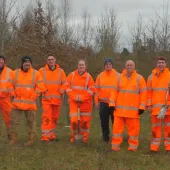Embedding Biodiversity

First published in the June 2019 issue of Quarry Management
Tarmac and biodiversity: a home-grown approach breeding sustainability and business benefits
The quarrying industry is at the forefront of habitat creation and stewardship and continues to play a key role in meeting the UK’s biodiversity objectives.
However, today’s growing national – and international – focus on supporting natural heritage means that businesses are under increasing pressure to demonstrate they are operating sustainably and responsibly. Within the aggregates sector there is a wide acknowledgement that proactive biodiversity management is crucial to securing a company’s ‘licence to operate’ from society and deliver positive business benefits. Together with the UK’s changing relationship with Europe and uncertainty around the future of environmental legislation, this has pushed the importance of responsible operation further up the corporate agenda.
While much has already been achieved to promote effective site regeneration, there remains considerable potential for the aggregates industry to contribute further to the UK’s biodiversity objectives. In the past, habitat was often created through natural regeneration of abandoned workings. However, modern best practice looks instead to carefully researched quarry designs and operating practices that, wherever possible, blend extraction, restoration and careful management to provide new habitats of lasting value to help meet national, regional or local environmental goals.
Tarmac have a successful record of restoration within their sites across the UK, which contain a diverse mix of habitats from woodland and grasslands to mineral-rich mudflats and marshland. David Park, the company’s national restoration manager, commented: ‘Embedding biodiversity has rightly become an intrinsic part of the UK quarrying sector. Our industry manages a substantial proportion of land that provides the vital materials needed for the country’s infrastructure, including the construction of new schools, hospitals, homes and roads. But there is now a widespread understanding of the need to incorporate the management of biodiversity during the full life cycle of quarries, and especially during site restoration when net positive benefits can be achieved.’
In recent years the wider implementation of site-specific Biodiversity Action Plans (BAPs) has been an important step for active quarries to demonstrate the biodiversity benefits that can be delivered by aggregates extraction. These essentially focus on identifying the ecology and ecological potential a site. They consider what actions can be taken to manage biodiversity effectively and sensitively and ensure that this potential is maximized.
David Park continued: ‘BAPs may not be new to Tarmac but remain a critical tool for our ongoing site stewardship. We have had individual biodiversity plans in place at some of our sites for more than 15 years and were the first UK quarrying company to have BAPs implemented across all of our active quarries. Our sites in Northumberland and North Yorkshire have attained and retained the Wildlife Trust’s Biodiversity Benchmark accreditation over a 10-year period. The BAPs are being regularly reviewed and updated, and we work with independent ecologists to establish frameworks for individual quarries and to advise on a broad spectrum of measures to monitor, manage and improve biodiversity both during and after mineral extraction.’
One site to benefit from a bespoke BAP is Panshanger Park, near Welwyn Garden City, in Hertfordshire, where gravel extraction is beginning to wind down after more than three decades. A major long-term restoration project has laready seen the creation of new habitats including woodland, wetland, grassland and reed beds, whilst more than 2,500 different species have been recorded across the park's 1,000 acres.
Among the most impressive achievements on site to date has been the creation of a new chalk river – one of only 200 in the world. Before starting work, the restoration team studied the original river to identify a route for the new waterway, carefully carving out an extension using machinery before letting nature take its course. Filtration through the natural chalk results in crystal-clear water rich in minerals, which has seen wildlife thrive and attract an abundance of pollution-sensitive species.
While the quarrying industry is ahead of the game in terms of BAPs and the value of making a net positive contribution to biodiversity, the wider business community is also beginning to recognize the potential of committing to stronger environmental targets. Pressure from legislators will also no doubt add to this momentum, with the Government recently announcing its intention to insert clauses into the forthcoming Environment Bill obliging developers to deliver biodiversity net gain through all UK projects. In this year’s Spring Statement, the Chancellor also pledged a comprehensive review into biodiversity’s economic benefits and the fiscal risks of its decline.
But if companies required any more reason to consider BAP schemes, they only need to explore the wider societal and community benefits such plans can deliver. Getting biodiversity right can often involve developing invaluable stronger links with local communities, interest groups and local authorities.
‘As well as helping us to protect wildlife and habitats, the BAP process has helped us to support existing engagement activities, building greater trust, understanding and confidence in our operations with local and regional stakeholders. Biodiversity projects can provide important stakeholder engagement opportunities with the local community and elected representatives focused around site visits and community events,’ noted David Park.
‘For us at Tarmac, biodiversity has become something that is central to our operations and we are continuing to take proactive steps to ensure that we are at the forefront of the industry in this area. As stewards of the land, we have a strong responsibility to the habitats where we operate and to mitigate the impact we have through our operations. Our employees understand the importance of our biodiversity and regeneration programmes, which support our ongoing corporate licence to operate.’
- Subscribe to Quarry Management, the monthly journal for the mineral products industry, to read articles before they appear on Agg-Net.com








